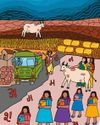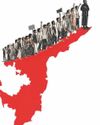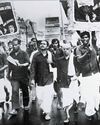'Pharma Money Is Corrupting Pediatrics Academy'
Outlook
|April 17, 2017
A former member of the Indian Academy of Paediatrics (IAP), Dr Vipin Vashishtha was ousted from the academy for highlighting the nexus between physicians and vaccine manufacturers last year. The Bijnor-based paediatrician documented the rampant corruption and system of favours in an open letter addressed to all members of the academy. In an interview with Arushi Bedi, he lays bare the nexus and talks about how he is still under fire for raising questions. Edited excerpts:

What made you blow the whistle on corruption in the medical fraternity?
I was convenor of the Committee of Immunisation in the IAP for six years. When I took over in 2011, there was no way to address the conflict of interest among the academy members. Some IAP members are on the advisory boards of big vaccine companies and many participate in CME (Continuing Medical Education) programmes organised by such companies and get honorarium.
According to WHO guidelines, members must declare such relations and also whether the physicians or any of their family members have received any cash or compensation in kind from vaccine-manufacturing companies.
So what happened?
The implementation of these guidelines was going quite well until 2015 but, in 2016, two members of the academy were inducted into the committee as chairman and nodal president. Taking advantage of their position in the academy, they star ted opposing the regulations on conflict of interest. The academy drafted its new immunisation schedule for the year on May 6, 2016. Certain recommendations on the schedule were unanimously passed by the committee and the regulatory board, and then uploaded on the official website as per protocol. Such recommendations also need to be published in the Indian Paediatrics Journal, which goes to all members of the academy, so they can be implemented. Yet, with no authority to do so and without giving any reasons, the president of the academy stalled the process of publication for several months and, eventually, the recommendations were not published.
Most practitioners across the country depend on these recommendations for their day-to-day vaccine administration practices. These recommendations are also monitored by the government and NGOs to evaluate policy for the entire country.
Cette histoire est tirée de l'édition April 17, 2017 de Outlook.
Abonnez-vous à Magzter GOLD pour accéder à des milliers d'histoires premium sélectionnées et à plus de 9 000 magazines et journaux.
Déjà abonné ? Se connecter
PLUS D'HISTOIRES DE Outlook

Outlook
The Big Blind Spot
Caste boundaries still shape social relations in Tamil Nadu-a state long rooted in self-respect politics
8 mins
December 11, 2025

Outlook
Jat Yamla Pagla Deewana
Dharmendra's tenderness revealed itself without any threats to his masculinity. He adapted himself throughout his 65-year-long career as both a product and creature of the times he lived through
5 mins
December 11, 2025

Outlook
Fairytale of a Fallow Land
Hope Bihar can once again be that impossibly noisy village in Phanishwar Nath Renu's Parti Parikatha-divided, yes, but still capable of insisting that rights are not favours and development is more than a slogan shouted from a stage
14 mins
December 11, 2025

Outlook
The Lesser Daughters of the Goddess
The Dravidian movement waged an ideological war against the devadasi system. As former devadasis lead a new wave of resistance, the practice is quietly sustained by caste, poverty, superstition and inherited ritual
2 mins
December 11, 2025

Outlook
The Meaning of Mariadhai
After a hundred years, what has happened to the idea of self-respect in contemporary Tamil society?
5 mins
December 11, 2025

Outlook
When the State is the Killer
The war on drugs continues to be a war on the poor
5 mins
December 11, 2025

Outlook
We Are Intellectuals
A senior law officer argued in the Supreme Court that \"intellectuals\" could be more dangerous than \"ground-level terrorists\"
5 mins
December 11, 2025

Outlook
An Equal Stage
The Dravidian Movement used novels, plays, films and even politics to spread its ideology
12 mins
December 11, 2025

Outlook
The Dignity in Self-Respect
How Periyar and the Self-Respect Movement took shape in Tamil Nadu and why the state has done better than the rest of the country on many social, civil and public parameters
5 mins
December 11, 2025

Outlook
When Sukumaar Met Elakkiya
Self-respect marriage remains a force of socio-political change even a century later
7 mins
December 11, 2025
Translate
Change font size

